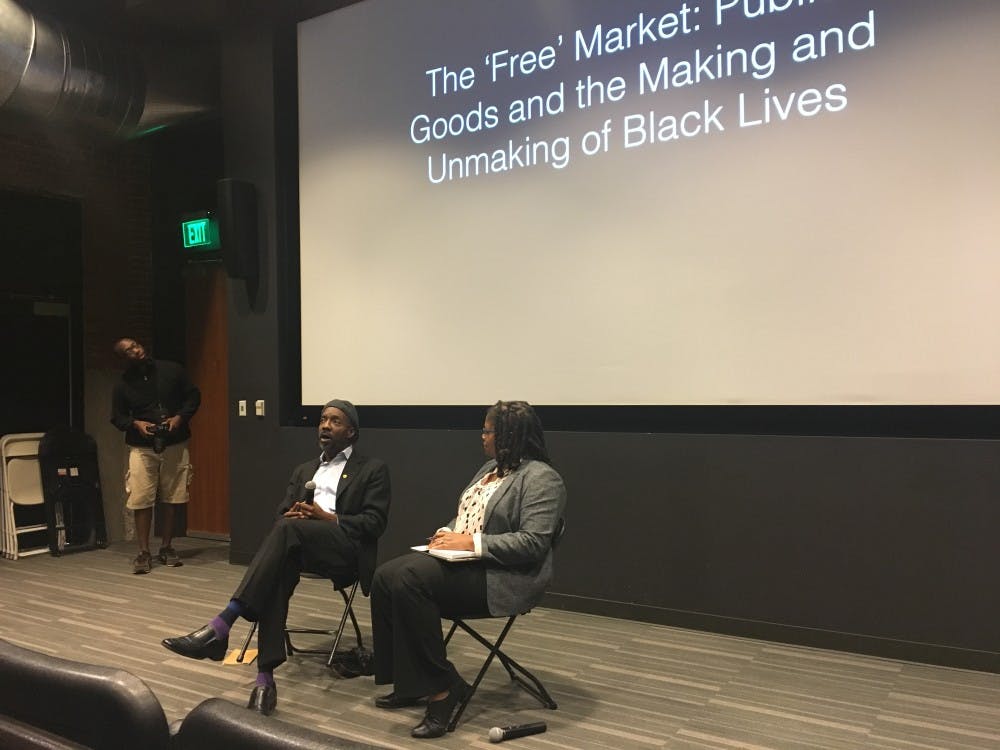With a booming voice and a backwards beret hat, Lester Spence, associate professor of political science and Africana studies at John Hopkins University, made his presence clear as soon as he spoke.
In his recent book, “Knocking the Hustle: Against the Neoliberal Turn in Black Politics,” Spence argued that while racism pervades the lives of many urban black people, it alone cannot explain the social inequality between black communities or the economic disparities within them. Neoliberalism—an economic ideology known for its embrace of private companies and free-market capitalism—can explain the disparities, he said during a lecture Friday.
“Y’all know my trifling stories are gonna be really trifling,” Spence said, before proceeding to talk about a time where he was stopped by police after driving a borrowed car with broken headlights.
Spence, who had been hanging out with his fraternity brothers, had no photo identification on him and didn't even know whose car he was driving. But, he said, the police officer let him go without a ticket.
“I didn’t know a life like that was possible, me being a black man,” Spence said. “There is something going on that we can’t use white supremacy to explain.”
Instead, he turned to the history of economic liberalism for answers, citing the New Deal programs during the 1940s, which significantly reduced inequality in the United States. Spence said that the reforms did not last, and the simultaneous inflation and unemployment of the 1970s inspired a new direction of economic policy.
“The federal government starts to cut support to cities,” Spence said. “And what the cities do more and more in the interim is rely more and more on the municipal bond market.”
As a result, he noted that many cities experienced changes such as downtown development, privatization of public services and a larger police force—woes that many black communities face today.
To explain neoliberalism, Spence turned to lyrics sung by rapper Jay-Z in “Diamonds from Sierra Leone,” a song released fellow rapper Kanye West.
“‘I’m not a businessman—I’m a business, man! Let me handle my business, damn,’” he said.
Although Spence mostly blamed neoliberalism for the inequality in cities, he said the influence of racism and white resentment should not be ignored.
“There’s this interracial thing going on, where black people are reproducing this dynamic and increasing hardship for poor black folk,” he said. “But there’s still this racial dynamic going on that we have to contest. And of course, we see this in the election of ‘homeboy’ [President Donald Trump].”
Whether the cause is racial or economic, however, Spence said the inequality in today’s cities is clear, even in Durham.
“I don’t know how much Durham spends on [parks and recreation], but I know that that cage y’all got somewhere around is [one of the] dopest basketball courts I’ve ever seen,” Spence said, referring to the YMCA at the American Tobacco Campus, which is available only to paying members.
“That should be a public good that we, in fact, privatized,” he said. “The public basketball courts in Durham should look like that. That’s what an integrated Durham would look like.”
Spence said this could change, but only through voter participation.
“Y’all just had an election, and y’all know what your primary turnout was? Thirteen percent,” Spence said, referring to Durham’s municipal primary election on Oct. 10. “We have to weaponize the vote again.”
In light of factors such as gerrymandering, moderator Adriane Lentz-Smith, associate professor of history, provided an opposing viewpoint to Spence’s argument.
“Well, I think the vote has been weaponized,” Lentz-Smith said. “We need to counter-weaponize it.”
After attending the lecture, Bria Davenport, who founder of an online resource center for Southern black women, said she appreciated how Spence connected different events and used anecdotes.
“I have been to lectures similar to this, and they were all just facts, facts, facts, with nothing personal about it,” Davenport said. “I would love for him to be my professor.”
Get The Chronicle straight to your inbox
Signup for our weekly newsletter. Cancel at any time.

